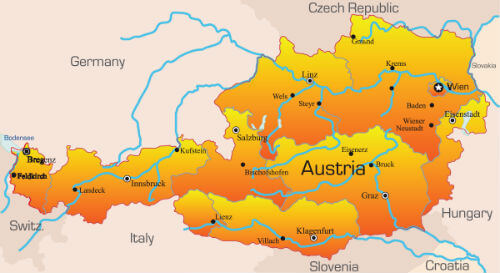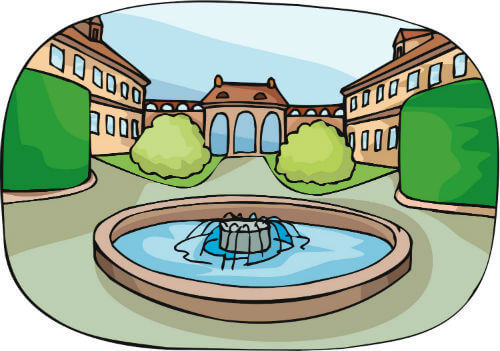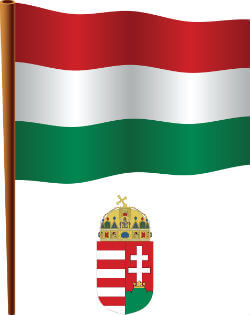English Reading Practice
Austria
Austria is a country in Europe. It borders Hungary, Slovakia, the Czech Republic, Germany, Switzerland, Italy, and Slovenia.

Today, Austria is a democracy with a Parliament, but until 1918, it was a monarchy. This means that it was ruled by a king. In 1804, the family that ruled Austria, the Habsburgs turned their monarchy into an empire, which meant that they ruled over more than one country.
The last emperor of the Austrian empire was Franz Josef. He ruled until 1918. While he is very well-known for being the emperor, it is his wife, Elisabeth, who was most loved and respected by the people of the empire. It was also Elisabeth who was responsible for making the empire even more important by creating a partnership with Hungary.
Empress Elisabeth of Austria, Queen of Hungary
Elisabeth, also called Sisi by her family, was born in a region of Germany called Bavaria in 1837. She had three siblings (sisters and brothers) including an older sister, Helene.It was decided that Helene would marry the future king of Austria, Franz Josef. However, at the same time that Franz Josef met Helene, he also met Elisabeth. He fell instantly in love with beautiful Elisabeth and asked to marry her instead. The two married in 1854.
Elisabeth was a very quiet and intelligent person who loved having the freedom to do whatever she wanted. When Elisabeth arrived at the palace (the house of the king) after her marriage, she found that she was very unhappy. The palace had many rules and she was not allowed to do what she wanted to.
This was hard for Elisabeth and she was often very sick as a result.

At the time that Elisabeth became Empress of Austria, the Austrian Empire ruled over many other nations and countries. One of these countries was Hungary. The Hungarians did not like being ruled over and wanted to be a sovereign nation. "Sovereign" means to rule itself.
Elisabeth traveled to Hungary shortly after she became Empress and fell in love with the country and the people. Perhaps this is because she identified with their wish to have the freedom to rule themselves.
She became their advocate in Austria. This means that she spoke positively about them and fought for them to get power of their own. Because of this, Elisabeth was very loved in Hungary.
Largely thanks to Elisabeth's influence on Franz Josef and her love of Hungary, in 1867, the Emperor negotiated (agreed on) a deal with Hungary. This agreement was called the Austro-Hungarian Compromise. A "compromise" is an arrangement or situation in which two people or countries agree to do something. The Austro-Hungarian Compromise created the Austro-Hungarian Empire.
In the Austro-Hungarian Empire, there were two centers of government: Vienna, the capital of Austria, and Buda, the capital of Hungary. Hungary was finally in control over its own government and people. In return for this control, Hungary named Franz Josef and Elisabeth, king and queen of Hungary.
Empress Elisabeth was famous for her beauty. But she was equally famous for her free spirit, love of travel, and passion for Hungary. Today, over 100 years after her death, she remains one of the most beloved figures (people) in Austria and Hungary.
And now, practice:
Austria – Exercises
Vocabulary Questions
1. What does "siblings" mean?a) parents
b) cousins
c) brothers and sisters
d) daughters and sons
b) cousins
c) brothers and sisters
d) daughters and sons
2. What does "sovereign" mean?
a) to
rule oneself
b) to rule another country
c) to make laws for another country
d) to be part of an empire
b) to rule another country
c) to make laws for another country
d) to be part of an empire
3. What does "negotiated" mean?
a) talked about
b) agreed on
a) disagreed on
b) ignored
b) agreed on
a) disagreed on
b) ignored
Grammar Questions
1. It was also Elisabeth who was responsible for making _________
empire even more important by creating _________ partnership with
Hungarya) a...a
b) the...the
c) a...the
d) the...a
b) the...the
c) a...the
d) the...a
2. Elisabeth, also called Sisi by her family, _________ in a region of Germany called Bavaria in 1837
a) born
b) is born
c) was born
d) borned
b) is born
c) was born
d) borned
3. Elisabeth traveled _________ Hungary shortly after she became Empress and fell in love with the country and the people.
a) to
b) at
c) on
d) of
b) at
c) on
d) of
Comprehension Questions
1. Why was Elisabeth unhappy when she arrived at the palace?_______________________________________________________________
2. How was Elisabeth involved in the Austro-Hungarian Compromise?
_______________________________________________________________
3. What was Elisabeth famous for?
_______________________________________________________________
Get Updates, Special Offers, and English Resources
Download your FREE GIFT (the first two chapters of
English Short Stories Book and Workbook)
as soon as you join!

By submitting your email, you consent to receiving updates and newsletters from us and to the sharing of your personal data with third parties for the purposes of sending you communications. We will not spam you. You can unsubscribe at any time. For more information, please see our privacy policy.





